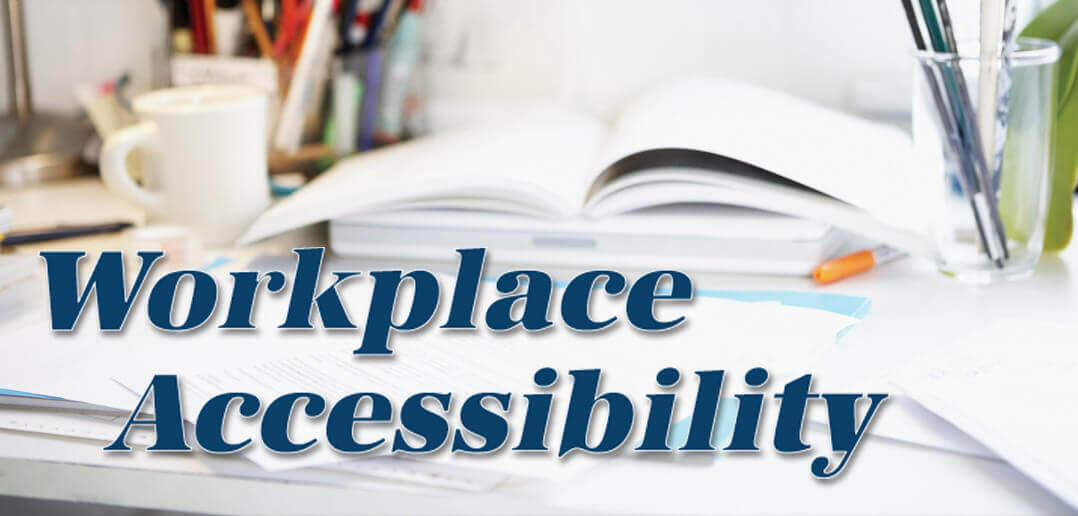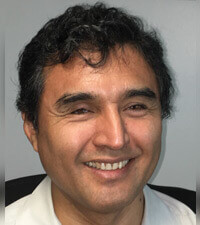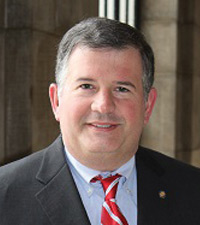Workplace Accessibility in Lincoln, NE
October is National Disability Employment Awareness Month, a time when we celebrate the many contributions of workers with disabilities. It also presents an opportunity to educate those in our community about the value of a diverse workforce inclusive of everyone’s unique skills and talents.
In an effort to promote further awareness, we consulted with several key resources: Nebraska VR, the Nebraska Commission for the Blind and Visually Impaired (NCBVI), and the Nebraska Commission for the Deaf and Hard of Hearing (NCDHH).
Nebraska VR (Vocational Rehabilitation) is an employment program for people who experience a disability. Nebraska VR’s Employment and Business Services Team serves the entire state and spends the majority of their time working with local businesses to identify creative hiring opportunities for job seeking candidates. Lindy Foley, Program Director of Employment and Business Services with Nebraska VR, highlights areas in which we can all benefit from a better understanding:
“The theme for this year’s National Disability Employment Awareness Month is #InclusionWorks and this could not be more true. Building an inclusive workforce is good for business as inclusive organizations benefit from higher employee job satisfaction, lower turnover rates, higher employee morale, and access to a new customer base.
The goal of inclusion is to place individuals in the world of work to live independently and enjoy the benefits and privileges that go with it. This includes becoming a taxpayer.
There are several commonly held myths we encounter when introducing our business services.
Myth: Hiring individuals with disabilities can create problems.
Truth: Hiring individuals with disabilities is an opportunity to foster a culture that respects the different skills and abilities of workers. Inclusion is also a vehicle to set your organization apart from competition.
Myth: Fostering an inclusive workplace is expensive.
Truth: Businesses recognize that hiring individuals with disabilities often increases moral, reduces turnover and absenteeism, while increasing productivity. In addition, businesses who hire individuals with disabilities may also be eligible to receive tax credits.
Myth: Inclusion means lowering standards.
Truth: Inclusion is about making each individual count by matching individual skills and abilities with the hiring needs of the business.
Because Nebraska enjoys one of the lowest unemployment rates in the country, businesses often find it a challenge to find qualified applicants. Many hiring managers may not know that Nebraska VR provides the services of a staffing agency with a focus on placing qualified workers who face challenges entering or re-entering the workforce. This allows businesses to tap into an underutilized pool of talent. Nebraska VR offers pre-screened qualified candidates, support with employee training and may even be able to provide a free trial employment period and other services. Nebraska VR may be able to help employers retain current employees who come to have a disability due to an accident, illness, injury or addiction. Sometimes this may include a workplace modification.
Businesses and hiring managers who have not yet worked with Nebraska VR or hired individuals with disabilities often experience fear of the unknown when it comes to employing individuals with disabilities. For example, many employers, regardless of the size of organization, have questions about the costs associated with hiring individuals who experience disabilities. In reality, there may be no costs associated with meeting ADA requirements. The Nebraska Assistive Technology Partnership is also a resource for identifying technology to meet the needs of individuals in the workplace.
Nebraska VR works with Nebraska Assistive Technology Partnership to meet the needs of individuals to be productive at work. Services can include evaluation, design, adaptation, or technical training. Assistive technology specialists can provide recommendations for worksite modifications for your employees. Demonstration and trial use of assistive technology equipment will be provided.
Another concern may be that the hire comes at a cost to productivity. The fact is Nebraska VR provides job candidates with the skills and abilities to do the job. Nebraska VR is an eligibility program that helps individuals with disabilities who want to work to prepare for, find, and keep a job. Individuals with physical, mental, intellectual, emotional, and learning disabilities receive services to identify their strengths and abilities in order to find success in the world of work. We offer customized and individualized services that are tailored to a person’s specific needs and job goal, with the ability to provide training and the supports necessary to help our clients succeed.
Nebraska VR can provide education and services to employers who have hired or are interested in hiring individuals with disabilities as well. This could include disability awareness training and an overview of the Americans with Disabilities Act. Training programs can be designed to meet your specific needs and are “customized” according to the skill level of the trainee.
Nebraska VR partners with business to provide work-based learning opportunities like internships, short-term employment, or pre-employment transition services. We have many innovative ways to introduce you to potential workers. Services are also available to provide employers with qualified applicants who are individuals with disabilities. Training after the hire, support to address disability related obstacles to continued employment, and accommodations are also available.
Nebraska VR’s business service team can be reached by email at VR.BAM@nebraska.gov or by phone at (877) 637-3422. More information about statewide services for business and individuals with disabilities is available at www.vr.nebraska.gov.”
Further emphasizing the importance of being educated about all of the options available, Carlos Servan, Deputy Director of VR Services for the Nebraska Commission for the Blind and Visually Impaired (NCBVI), has also taken the opportunity to clarify a few things regarding workplace accessibility and inclusion:
“With the proper training, blind people can compete on an equal basis with their sighted peers. There are many misconceptions about the abilities of blind people. Almost everything that you do visually, you can also do non-visually. We have had blind people work as teachers, carpenters, lawyers, chefs, small business owners, ophthalmologists, marine biologists, manufacturing positions, website designers—the list goes on from there.
In fact, many of the methods that blind people use in the workplace, sighted coworkers start to use as a result of exposure. A blind cafeteria worker needed to find a way to slice pie evenly, so we developed a pie slicer for her and everyone started to use it because it was easier. For a dispatcher we installed a board so that she could keep track of the keys easier. It increased the efficiency of the whole office since they didn’t have to search for keys any longer.
Many employers are concerned about safety on the job. There have been studies that show that blind people are actually safer on the job than their sighted counterparts. The biggest barrier that blind people face is the attitudes of the public and employers because they are not sure how a blind person would do the job. Sight is a very powerful sense that most of us rely on for the information that we take in. A blind person can effectively use their other senses to travel independently, use the computer, cook, clean, take care of children and all the other tasks that need to be accomplished daily. They can’t drive but self-driving cars are around the corner.
The main issue that blind people face is accessibility. Sometimes websites and other software programs are difficult to access with screen reading software. It is also a barrier for blind customers or clients to access your business services. NCBVI is available to consult with businesses and provide resources to build programs and websites that are accessible to the blind.
Our team at NCBVI is very knowledgeable about accommodations in the workplace. We have technology specialists on our staff who are able to assess equipment and make recommendations. NCBVI will purchase all equipment necessary to make your business accessible to a blind employee. There may be some resources that may need to be Brailed or put into a different format. NCBVI is available to make that happen.
On the other end of the spectrum, we assist those seeking employment by helping them develop the compensatory skills that they need to be competitive in a workplace. We teach job seeking skills, develop resumes, provide job leads, and offer job coaching as needed. We provide internships and job readiness skills. We partner with businesses to work on interviewing skills and networking. Essentially we work out any accommodations that need to be made and provide those so there is little to no effort required on the part of the employer.”
Similarly, John Wyvill, Executive Director of the Nebraska Commission for the Deaf and Hard of Hearing (NCDHH), provides information from yet another perspective:
“Every person with some form of hearing loss has different needs. Communication accommodation needs for each employee can be determined by discussion on what they need for proper communication access. Many employers do not understand hearing loss, since it cannot be seen it is often overlooked. This is why assistive technology, interpreters, a telecommunication relay service, and other options are crucial to bridge that communication gap.
For individuals who are hard of hearing, it is important to remember those with hearing aids or cochlear implants do not ‘make’ an individual hear; it increases their access to sound. A common thought is, ‘If I talk louder, they can understand me.’ Hearing sounds and understanding speech are two different concepts. For those who are Deaf, it is important to discuss with them what mode of communication access they prefer, whether it be a sign language interpreter present, live captioning in meetings, or a video relay service provider.
Technology is in every aspect of today’s world; and for assistive technology in the Deaf and Hard of Hearing communities, that is no different. There are many different types of equipment that can be used to accommodate not only hard of hearing and deaf individuals. Again, it is important to work with each individual, as their situation will be unique to find how their needs can be met. The Nebraska Commission for the Deaf and Hard of Hearing has Advocacy Specialists that are willing to provide assistance with this technology as well as provide and offer training for employers and staff to make the transition smooth and most effective.
The interested applicant or employee who is Deaf or Hard of Hearing typically has the role to notify what accommodation may be most effective for them to do their essential job duties. However, it is not a bad idea for an employer to bring up conversation and ask what communication access accommodations will be needed. The Commission also has developed a resource handbook for advocacy, and one of our Advocacy Specialists would be more than willing to work with an employer, employee, or applicant to help provide these services.
Please do not hesitate to reach out to NCDHH, via website, e-mail or phone. We have regional offices located throughout Nebraska. To help find the closest office near you, please call us by telephone at (800) 545-6244 or (402) 471-3593, reach out by e-mail at NCDHH@nebraska.gov, or visit our website at www.ncdhh.nebraska.gov.”
Coinciding with October’s National Disability Employment Awareness Month (NDEAM), those in our community are called upon to reflect on the important role disability plays in workforce diversity. In observing the contribution of workers with disabilities and the value of a workforce that is inclusive of their skills and abilities, NDEAM is an opportune time to review business hiring practices to ensure they convey a commitment to an inclusive workplace culture. We encourage you to reach out to our local resources to find out more about what you can do in your workplace to promote accessibility for all.




